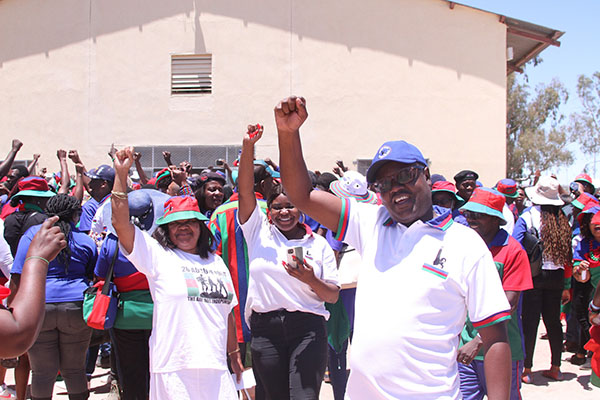Aletta Shikololo
A small group of Namibians founded the South West Africa People’s Organisation (Swapo) on 19 April 1960 to fight for the independence of their country from colonial rule. Sixty-three years later, Swapo remains one of Africa’s most storied political parties, with a legacy of struggle and success that has inspired generations.
To celebrate this milestone, many Namibians are reflecting on the party’s achievements and looking toward its future role in addressing critical issues affecting the country.
President Hage Geingob, who is also the Swapo president, took to Twitter to congratulate the party on its momentous anniversary.
“Swapo, a glorious movement, was formed with the mission of liberating Namibians from apartheid oppression. Swapo succeeded in that historic mission. Over the past 33 years, Swapo has been hard at work to unite and ensure the economic development of Namibia,” he wrote, adding the party will continue working to complete its mission of the socio-economic well-being for all. The party’s secretary general, Sophia Shaningwa, also paid tribute to the sacrifices made by Swapo members in the fight for freedom.
In a statement, she emphasised the resilience and triumph of Africans and honoured all those who contributed to the party’s rich heritage.
“The party remains committed to its responsibilities and is humbled by the support of the Namibian people, which they will never take for granted,” she said. While the party’s role in liberating Namibia from colonial rule remains a significant achievement, political analysts warned the country now faces new and complex challenges, including economic struggles, corruption and inequality – a daunting task to tackle as a governing party.
Political analyst, Ndumba Kamwanyah, commented on the anniversary, stating their achievement in mobilising ethnic groups to fight the apartheid regime is impressive.
While acknowledging the party’s contribution to democracy, peace and stability, Kamwanyah also highlighted ongoing challenges, including economic emancipation, corruption and resource management.
As such, he argued that celebration was not apt, given the country’s numerous social issues. “In terms of achieving economic freedom, a considerable number of people remain stuck in poverty, corruption continues to be a widespread issue, the wealth gap between the rich and the poor is increasing, and there are significant challenges related to resource management, including water and sanitation. Given these prevailing social illnesses, one cannot celebrate,” he opined.
Another analyst, Fanuel Kaapama, shared similar sentiments, stating that while some may still remember the hardships endured during apartheid, a majority of the current population was born after independence.
“Therefore, the challenge for the Swapo party is to rely less on past liberation achievements and create a new legacy that addresses the needs of the current, largely young generation to help them escape poverty. This task is made more difficult by global challenges, such as the war in Ukraine and the impact of Covid-19,” he said.
For the past years, the party has weathered internal divisions and the challenges of governing a young democracy, among many others.
Disunity in the Swapo party of Namibia has been a significant issue in recent years, with infighting seen to be causing divisions.
The party has faced criticism over corruption and leadership, with incidents, such as the controversial 2017 elective congress and the 2019 presidential elections highlighting deep divisions within the ruling party.
“The party must be creative and willing to do more to tackle these issues,” said Kaapama.
– ashikololo@nepc.com.na



